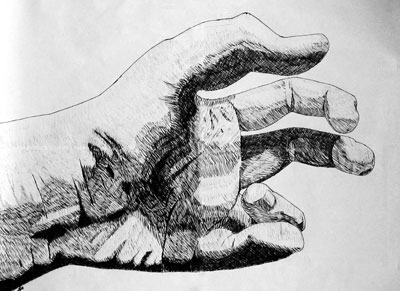All Nonfiction
- Bullying
- Books
- Academic
- Author Interviews
- Celebrity interviews
- College Articles
- College Essays
- Educator of the Year
- Heroes
- Interviews
- Memoir
- Personal Experience
- Sports
- Travel & Culture
All Opinions
- Bullying
- Current Events / Politics
- Discrimination
- Drugs / Alcohol / Smoking
- Entertainment / Celebrities
- Environment
- Love / Relationships
- Movies / Music / TV
- Pop Culture / Trends
- School / College
- Social Issues / Civics
- Spirituality / Religion
- Sports / Hobbies
All Hot Topics
- Bullying
- Community Service
- Environment
- Health
- Letters to the Editor
- Pride & Prejudice
- What Matters
- Back
Summer Guide
- Program Links
- Program Reviews
- Back
College Guide
- College Links
- College Reviews
- College Essays
- College Articles
- Back
Hypoplastic Hand
There are thirty-four muscles in the human hand. I have thirty-one. I am 1 in 100,000, but I am more than a statistic. I am disabled- a term I rarely use aloud to others, but my right dominant hand is classified as hypoplastic, possessing three less muscles than any human hand. Despite my disability- few people know- I look fine until upon closer scrutiny, one sees my right hand has thinner bones, poor circulation, and a lack of muscle mass. This story of discovering my disability, is ongoing, as the research behind my diagnosis is still emerging into the science world.
Upon discovering my difficulties at a young age, I did not distinguish the difference between my peers who could snap effortlessly or hold a pencil with ease. Feeling pain, I gritted my teeth through it to keep up with my peers, not wanting to fall behind. When I was younger, the pain was manageable, until my fine motor skills became an important part of my high school career.
Sitting in class throughout the day requires students to hold a writing utensil for copious hours. Upon my freshman year, I sought medical assistance. At the time, my hand was not diagnosed as a “disability” but I underwent a surgery in hopes of improvement. Not wanting to break my first year of perfect attendance in high school, I underwent the procedure involving stem cells, hoping to re-grow my muscles, the summer of my sophomore year. When September rolled around, my right hand was still adjusting to the cells, which made writing painful with a brace. My Mother offered to get me a laptop for school, but I gritted my teeth and dissuaded her. I wanted to show everyone that I could keep up with my peers, despite my hand’s problems.
Even with the surgery, the pain returned in a few months, which left me answerless once more. The stem cells did not fully take, so I sought another doctor. Between my sophomore year and junior year, I travelled through numerous states and doctors to find an answer. One day as I sat in the doctor’s office, the doctor uttered the words, “I’m afraid to tell you that you are considered disabled because of your hand.” At the time, I was surprised- I had lived sixteen years without the term, so how could it be thrown onto me all of a sudden? With the official diagnosis and term, I continued my studies in school, not letting anyone know as I did not want any special accommodations. During that time, I sought more doctors who I hoped would have a cure for my “disability.”
As junior year ended, the search for a solution became more prevalent. It was in another state, a five hour drive away, at Johns Hopkins Hospital that I found my solution. Meeting with the doctor, who specializes in hand surgery, the doctor told me of a solution- a double procedure surgery in hopes to aid my fine motor skills, but not to cure them. Trusting science, I decided I would take the risk. My family did not fully support my decision, but it was a decision only I could make for myself. Now as I type this, my hand is the same as it has been for the last seventeen years as my surgery date approaches. My story is not over, but my disability has changed who I am. I have made decisions for myself, faced physical barriers, and seen the horrors of far-worse disabilities in children younger than me. If I learned anything it would be, disability does not define you, but allows you to see the world differently. My story is ongoing as the medical world is rapidly changing every day through research. My story is to be continued…

Similar Articles
JOIN THE DISCUSSION
This article has 0 comments.

My health condition has changed since when I wrote this for my college essay.